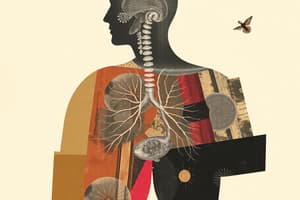Podcast
Questions and Answers
What is the term for a process that occurs without air?
What is the term for a process that occurs without air?
- Aerobic
- Anaerobic (correct)
- Fermentation
- Glycolysis
What is the term for a process that occurs in the presence of air?
What is the term for a process that occurs in the presence of air?
- Glycolysis
- Calorie
- Aerobic (correct)
- Anaerobic
What is glycolysis?
What is glycolysis?
Process in which glucose is broken down into two molecules of pyruvic acid
What is the matrix in biology?
What is the matrix in biology?
What is a calorie?
What is a calorie?
What is fermentation?
What is fermentation?
What is the Krebs cycle?
What is the Krebs cycle?
What is ATP?
What is ATP?
Cellular respiration and photosynthesis are considered ______ processes.
Cellular respiration and photosynthesis are considered ______ processes.
Flashcards are hidden until you start studying
Study Notes
Key Vocabulary in Biology
-
Anaerobic
- Refers to processes that occur without the presence of air or oxygen.
-
Aerobic
- Describes processes that take place in oxygen-rich environments.
-
Glycolysis
- A metabolic pathway that breaks down glucose into two molecules of pyruvic acid, generating energy in the form of ATP.
-
Matrix
- The innermost compartment of a mitochondrion, playing a critical role in energy production.
-
Calorie
- The amount of energy required to increase the temperature of 1 gram of water by 1 degree Celsius, commonly used as a measure of energy content in food.
-
Fermentation
- A metabolic process that converts sugar to acids, gases, or alcohol in the absence of oxygen, resulting in either lactic acid or ethyl alcohol.
-
Krebs Cycle
- A key phase of cellular respiration initiated by pyruvic acid, resulting in the production of carbon dioxide and energy-rich electron carriers.
-
Glycolysis (repeated)
- This term also refers to the process that releases energy by breaking down food molecules in the presence of oxygen, contributing to aerobic respiration.
-
ATP (Adenosine Triphosphate)
- The main energy currency of the cell, serving as an electron carrier that accepts electrons during glycolysis.
-
Opposite Processes
- Cellular respiration and photosynthesis are complimentary processes; respiration converts glucose into energy while photosynthesis uses sunlight to create glucose.
Studying That Suits You
Use AI to generate personalized quizzes and flashcards to suit your learning preferences.




